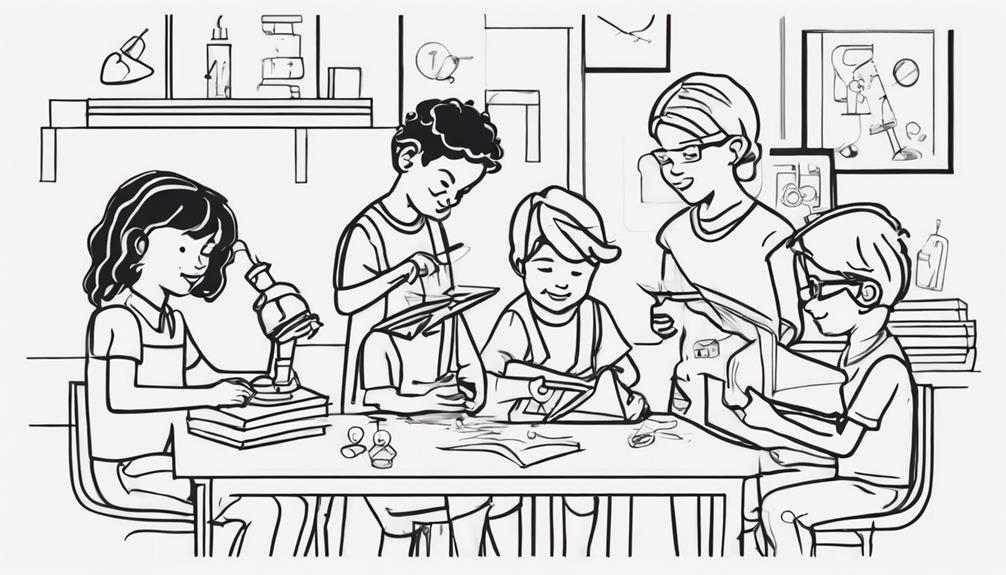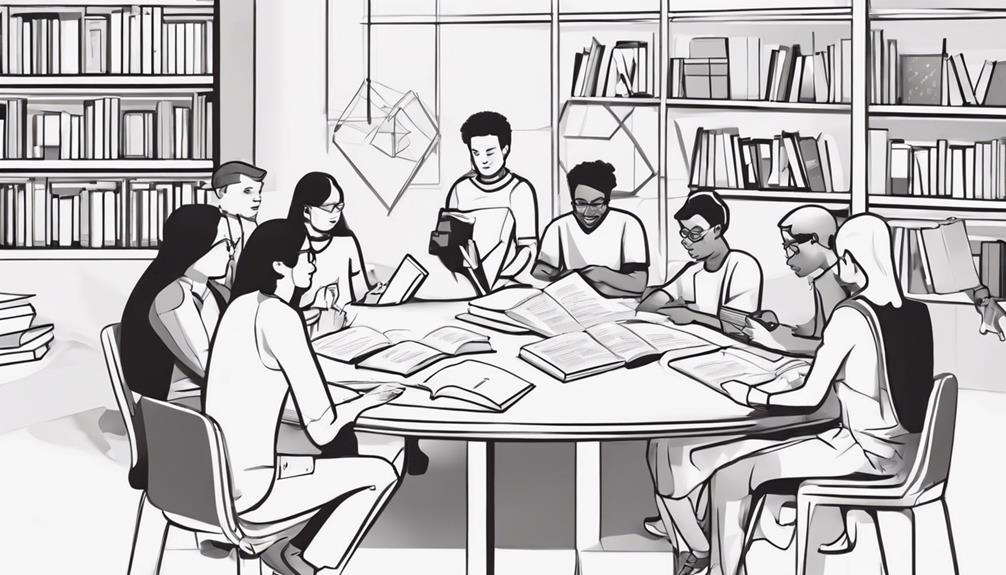The reasons behind our decision to pursue education and attend school are multifaceted, deeply ingrained in societal constructs, and intertwined with personal aspirations. From a scientific standpoint, the necessity of formal education can be viewed as a strategic investment in individual and collective advancement. However, the underlying motives for engaging in this structured learning environment extend beyond mere acquisition of knowledge or skills. By exploring the intricacies of this foundational institution, one can uncover the intricate web of factors influencing our educational journey and shaping our perceptions of the world around us.
Key Takeaways
- To acquire foundational skills for lifelong learning and personal development.
- To cultivate social skills, empathy, and positive relationships through interactions.
- To develop critical thinking, analytical abilities, and decision-making skills.
- To prepare for higher education, professional success, and civic engagement in the community.
Foundation for Lifelong Learning

Attending school consistently lays the essential groundwork for lifelong learning by instilling foundational skills such as reading, writing, and critical thinking, which are integral for intellectual development and future educational pursuits. Education allows individuals to acquire the necessary skills to navigate complex information, think critically about various subjects, and communicate effectively through writing. These skills form the backbone of academic success and pave the way for continued learning in diverse fields and disciplines. By mastering these fundamental skills early on in their educational journey, students are better equipped to comprehend advanced concepts, engage in analytical thinking, and contribute meaningfully to discussions and debates. Moreover, the educational foundation laid in school not only fosters intellectual growth but also instills a curiosity for learning that extends beyond the classroom. This curiosity drives individuals to seek knowledge independently, explore new ideas, and pursue lifelong learning opportunities, making education an invaluable asset in shaping one's personal and professional development.
Building Social Skills and Relationships
School not only serves as a foundation for academic learning but also plays a crucial role in fostering social skills and cultivating relationships essential for personal growth and development. Developing social skills and building relationships in a school setting are vital components of a well-rounded education. Here are three key ways in which schools contribute to the development of social skills and relationships:
- Structured Environment: School provides a structured environment where students learn to interact with peers and teachers, helping them understand social norms and etiquettes essential for effective communication and relationship-building.
- Diverse Classmates: Interacting with classmates from diverse backgrounds exposes students to different perspectives, fostering empathy, tolerance, and appreciation for cultural diversity.
- Collaborative Activities: Collaborative projects, group activities, and school events such as sports days and cultural festivals promote teamwork, communication skills, and social interaction, enhancing students' ability to work effectively with others and build positive relationships. These experiences in school contribute significantly to the development of social skills and the nurturing of meaningful relationships.
Fostering Critical Thinking Abilities

Encouraging students to engage in analytical thinking processes is fundamental to nurturing their critical thinking abilities within an educational setting. Critical thinking skills are essential for students to analyze information, evaluate evidence, and develop reasoned arguments. Through problem-solving activities, discussions, and projects that require logical reasoning and creative thinking, students hone their ability to question assumptions, consider multiple perspectives, and make informed decisions. By participating in structured classroom activities that promote critical thinking, students not only enhance their cognitive skills but also improve their decision-making capabilities and overall intellectual competence. Developing critical thinking abilities in school is crucial as it equips students to navigate complex issues, think independently, and adapt to diverse challenges in the future. The table below illustrates how critical thinking skills are nurtured in students through various educational activities:
| Critical Thinking Activities | Description |
|---|---|
| Problem-solving tasks | Engage students in finding solutions to complex problems. |
| Classroom discussions | Encourage students to consider different viewpoints and defend their opinions. |
| Project-based learning | Require students to apply critical thinking to real-world scenarios and develop innovative solutions. |
Preparing for Higher Education
In the pursuit of higher education, the foundation laid during school years is crucial. School equips students with the necessary skills and knowledge essential for success in college or university. This academic groundwork sets the stage for advanced studies and specialized fields, facilitating access to diverse opportunities in higher education.
Higher Education Benefits
Higher education, being a significant driver of socioeconomic advancement, equips individuals with specialized knowledge, skills, and critical thinking abilities essential for navigating the complexities of the modern workforce. When considering the benefits of higher education, it is crucial to acknowledge the following:
- Increased Earning Potential: Degree holders tend to earn significantly more than non-degree holders, providing a strong economic incentive for pursuing higher education.
- Specialized Training and Skills: Higher education offers access to specialized knowledge and training in specific fields, enhancing personal growth and career opportunities.
- Job Security and Fulfilling Careers: Graduates of higher education programs often experience better job security and are more likely to secure fulfilling, well-paying careers, contributing to overall satisfaction and success in the workforce.
Academic Advancement Opportunities
School serves as a foundational platform for students to cultivate the academic knowledge and skills necessary to prepare for higher education and future academic pursuits. Academic advancement opportunities in school include access to advanced courses, extracurricular activities, and support services that foster academic excellence. Students can engage in college preparatory programs, standardized tests, and guidance counseling to plan for their future academic endeavors. Additionally, schools provide resources such as libraries, research materials, and academic advisors to support students' academic growth. Participation in rigorous academic coursework and maintaining good grades not only enhances learning but also increases the likelihood of admission to colleges and universities. Developing the essential skills needed for higher education starts in school, laying the groundwork for future academic success.
Equipping for Future Employment

Attending educational institutions not only imparts essential skills and knowledge but also lays the foundation for individuals to excel in their future careers. Schools play a crucial role in equipping students for future employment by providing them with the necessary tools to succeed in the professional world. This preparation is vital for several reasons:
- Skill Development: Schools offer a structured environment where students can develop critical skills such as communication, problem-solving, and teamwork, which are highly valued by potential employers.
- Career Path Preparation: The education and training received in school help individuals identify their interests and strengths, guiding them towards suitable career paths that align with their abilities and ambitions.
- Demonstration of Commitment: Regular school attendance showcases reliability and commitment, traits that are highly sought after by potential employers seeking dedicated and responsible individuals for their organizations.
Cultivating Personal Growth and Confidence
In the realm of education, the cultivation of personal growth and confidence emerges as a fundamental aspect that extends beyond mere skill acquisition and career preparation. School plays a crucial role in providing opportunities for personal growth by exposing students to diverse experiences and perspectives. Through academic achievements, social interactions, and personal development, attending school helps cultivate confidence in individuals. Interactions with peers and teachers in the school environment are instrumental in fostering social skills and self-assurance. Engaging in extracurricular activities further promotes personal growth and enhances self-esteem by allowing students to explore their interests and talents. The supportive setting of school environments encourages students to step out of their comfort zones, leading to increased personal growth and confidence. Overall, the holistic development of students in schools not only equips them with knowledge but also nurtures their social skills and fosters personal growth, laying a strong foundation for their future endeavors.
Nurturing Civic Responsibility

School plays a crucial role in nurturing civic responsibility by imparting knowledge on citizenship rights and responsibilities. Through civics classes and community service projects, students learn about the structure of government, the importance of participation in democracy, and the significance of public service. Education in school cultivates values such as respect, tolerance, and social responsibility, laying the foundation for active engagement in civic affairs.
Building Community Engagement
Encouraging active participation in service projects and volunteering initiatives, schools play a crucial role in nurturing civic responsibility among students.
Key Points:
- Enhanced Social Awareness: By engaging in community service, students develop a deeper understanding of social issues and the importance of actively contributing to society.
- Promotion of Community Cohesion: Through partnerships with local organizations, schools create a sense of unity and collaboration within the community, fostering a supportive environment for all members.
- Development of Empathy and Compassion: Participation in community engagement activities helps students cultivate empathy towards others, promoting a culture of kindness and understanding within the social fabric.
Schools serve as catalysts for instilling values of civic responsibility, ultimately shaping students into conscientious individuals who actively participate in building a better community.
Fostering Social Awareness
By fostering social awareness, educational institutions play a vital role in shaping individuals' understanding of civic responsibilities and their impact on society. Schools achieve this by teaching students about the importance of civic responsibilities and encouraging active participation in community service projects. Through classroom discussions and activities, students gain insights into social issues, diversity, and the consequences of their actions on others. Moreover, schools promote empathy and understanding by fostering consideration of different perspectives and advocating for social justice. By instilling values such as respect, tolerance, and cooperation, educational institutions help students become responsible and engaged members of their communities. Overall, fostering social awareness in schools is essential for nurturing civic responsibility and creating socially conscious individuals.
Encouraging Public Service
Instilling a culture of public service in individuals cultivates a profound sense of civic duty and responsibility.
Key Points:
- Enhanced Life Skills: Participation in public service activities equips individuals with valuable life skills such as leadership, communication, and problem-solving abilities.
- Fostering Community Engagement: Engaging in public service fosters a sense of belonging and connection within communities, promoting collaboration and social cohesion.
- Promoting Altruistic Values: Volunteer work not only contributes to the betterment of society but also instills altruistic values in individuals, nurturing a sense of empathy and compassion towards others.
Encouraging public service not only provides practical experiences in addressing societal needs but also plays a vital role in shaping individuals into active and responsible members of their communities.
Promoting Gender Equality and Inclusivity

Schools play a pivotal role in advancing gender equality and fostering inclusivity through various educational initiatives and practices. By providing equal opportunities for both boys and girls, schools promote gender equality and contribute to a more inclusive society. Inclusive school environments help create a sense of belonging for students of all genders, promoting diversity and acceptance. Gender-sensitive curriculum and teaching methods challenge stereotypes and empower students to break gender norms. This fosters an environment where all students can thrive academically and socially, regardless of gender. Education in schools is crucial for shaping attitudes towards gender equality and promoting respect for all individuals.
| Ways Schools Promote Gender Equality | Effects of Promoting Gender Equality |
|---|---|
| Equal opportunities for all genders | Sense of belonging for students |
| Gender-sensitive curriculum | Challenge stereotypes and empower |
| Inclusive environments | Diversity and acceptance |
Frequently Asked Questions
What Is the Purpose of the School?
The purpose of schools is multifaceted. They serve as institutions that provide education benefits through the impartation of knowledge and skills essential for personal growth. Schools aim to prepare individuals for adulthood by equipping them with the necessary tools for success in various aspects of life. Additionally, schools play a crucial role in fostering social skills, critical thinking, and a sense of community. They provide a safe environment for children and act as gathering places for community events.
Why Do We Have to Take School?
Education benefits individuals by providing them with a structured learning opportunity. School attendance is crucial for acquiring knowledge, developing critical thinking skills, and fostering social interactions. Through education, students gain the necessary tools to navigate the complexities of the modern world and achieve personal growth. Attending school ensures that individuals are equipped with the foundational skills needed for success in various aspects of life.
Why Do Humans Have to Go to School?
Education benefits are paramount in shaping individuals. School plays a crucial role in the learning process by providing structured environments for intellectual growth. Additionally, schools are essential for the development of social skills and personal growth. Through interactions with peers and authority figures, students learn to navigate social dynamics, communication, and collaboration. These experiences are crucial for holistic development and preparing individuals for success in various aspects of life.
Why Do They Make Us Go to School?
The education system mandates school attendance to fulfill academic obligations and ensure students acquire essential skills and knowledge. It serves as a structured environment for learning, fostering personal and societal development. Attendance at school is crucial for equal access to education, academic success, and future opportunities. Ultimately, compulsory schooling supports the development of a literate and skilled workforce, contributing to individual growth and societal advancement.
Conclusion
In conclusion, the multifaceted reasons for attending school encompass foundational learning, social skill development, critical thinking, preparation for higher education and future employment, personal growth, civic responsibility, and promotion of gender equality. By participating in formal education, individuals are equipped with the necessary tools and knowledge to navigate the complexities of the modern world. However, there may be one crucial aspect of school attendance that is often overlooked, a hidden benefit that ties all these reasons together.
